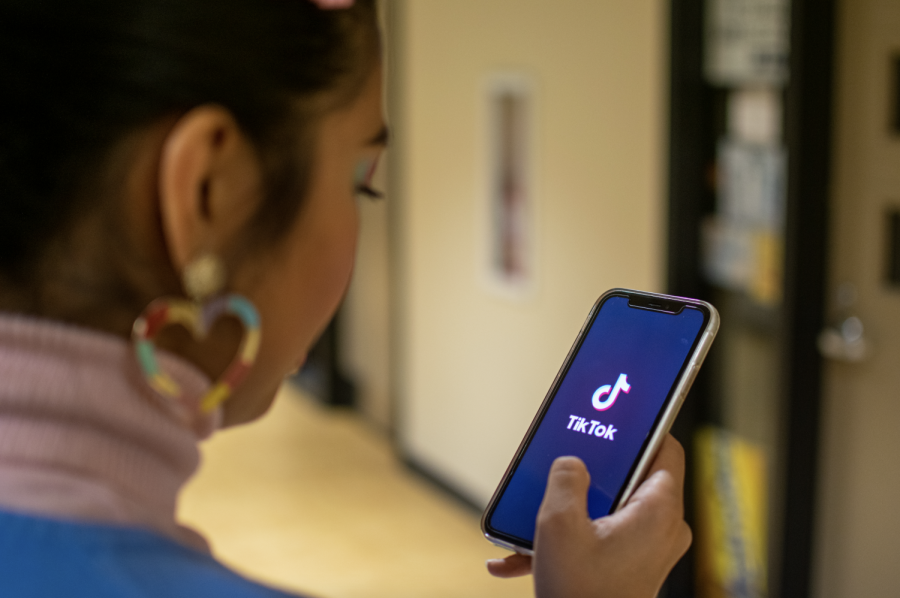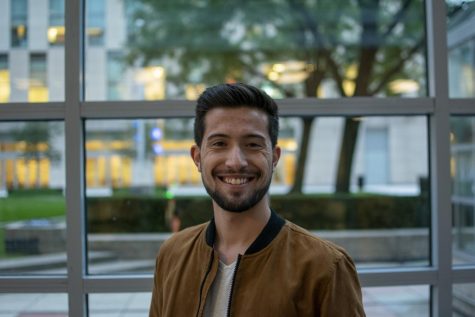Students React to TikTok Investigation
Experts fear the popular app could be used to manipulate or harm Americans
ANDREW BEECHER/THE OBSERVER
TikTok is a popular social media app among Fordham Students, but the U.S. Army believes it could be a risk to their security.
December 4, 2019
Fordham students keen on using the popular social networking app TikTok may be giving up more information than they bargained for.
The app, which many students have dubbed “the next Vine,” has gained mounting scrutiny from American tech executives and government officials in recent months. They fear that the app’s Chinese parent company, ByteDance, cannot be held accountable by its American userbase, which primarily consists of teenagers and young adults. According to a report from Reuters, more than 60% of all 26.5 million monthly TikTok users are between the ages of 16 and 24.
Fordham students using the app attribute its popularity to the lighthearted and “honest” online community.
“It’s a way that I can make fun media content that feels more real,” said Jake Kujlis, Fordham College Lincoln Center (FCLC) ’22, who is a new user to the app. “Instagram is a total facade, and Snapchat is good for communicating with individual people, but TikTok allows me to make fun of myself and put creative content out into the world.”
However, it’s precisely that “real” content that troubles cybersecurity officials. Henry Edgington, FCLC ’22, is a computer science major and student worker with Fordham IT. “What’s got the experts concerned,” he said, “is that, when you install an app, it puts a ton of software on your phone. So while you think you’re just uploading funny videos, that thing could be coded to steal your passwords, bank accounts, location history, photos, everything.”
Responding to these concerns, several high-profile elected officials from both major political parties have recently made open calls for U.S. intelligence agencies to investigate TikTok and ByteDance, as well as the app’s potential ties to the Chinese government.
In mid-November, Army Secretary Ryan McCarthy told CNBC that the army has “begun a review with Army Cyber Command on the potential vulnerabilities associated with that app.” Officials expect a final report “right around the Christmas holiday.”
Kujlis, a communications major who has experience in both personal and professional social media accounts, noted that he was not ready to swear off the app just yet. “I know about the investigations. Not all the specific details, but I’m keeping an eye on them,” he said. “I’m not too worried though. At the end of the day, I don’t really care if China knows what my face looks like.”
He was also aware of the potential data vulnerabilities, but expressed that the creativity of the outlet was currently worth the risk. “Unless they actually start hacking into my accounts, I don’t think it really matters because Google has all that information anyways,” he said.
Yet discussions on Capitol Hill about the security risks of apps like TikTok have exploded in the past year. The U.S. intelligence community has near-certainty that in 2016, Russia used data collected through social media to inform its interference in the presidential election.
It has been confirmed that a similar disinformation campaign is currently happening on Facebook, Twitter and Instagram, and that Russia is actively attempting to shift the blame of its interference to Ukraine. According to a report by The New York Times, top security experts believe that this is a strategic move by the Russians to undermine the impeachment inquiry.
Now investigators are trying to determine if TikTok presents a similar risk. The most pressing issues are determining if the app collects unnecessary personal data or promotes content that might be used to influence American opinions and behavior. Several of the investigators’ fears have already been confirmed. In February, Vox reported that TikTok had been fined $5.7 million for illegally collecting data on children under the age of 13.
The Washington Post and The Guardian both reported that TikTok manipulates or bans content based on several controversial criteria, such as protests against the Chinese government. In early December, The Verge reported that TikTok apparently restricted content from users that face a “high risk of bullying,” such as those with disabilities or disfigurement.
TikTok has reversed several of its most controversial policies since they have come to light, and the TikTok U.S. team maintains that it is run independently from Chinese influence. However, many experts remain unconvinced.
Even Mark Zuckerburg, CEO of Facebook and recent target of Senate oversight, has publicly criticized TikTok’s clampdown on expression and speech. According to initial reports from Buzzfeed News, Zuckerburg had tried to purchase the platform when it was still Music.ly and later tried to suffocate the app with Facebook’s own service, Lasso.
Zuckerburg has started appealing to young adults directly to try undermine the platform that he says censors free speech. “Until recently, the internet in almost every country outside China has been defined by American platforms with strong free expression values,” Zuckerberg said in a speech to students at Georgetown University in October. “While our services — like WhatsApp — are used by protesters and activists everywhere due to strong encryption and privacy protections, on TikTok, the Chinese app growing quickly around the world, mentions of these protests are censored, even in the U.S.”
Critics of Zuckerburg are skeptical of his authenticity to grassroots political expression. According to the same BuzzFeed News report, several Facebook employees have said that the company’s bludgeoning of TikTok is a direct result of Facebook trying to validate its own loose censorship rules. Since the 2016 Presidential election, Facebook has come under fire for a variety of business practices it has defended under the umbrella of “free speech,” including algorithms that are known to prioritize polarizing content and policies that allow politicians and interest groups to post intentionally false advertisements to sway public opinion.
However, Edgington maintained that the conversations surrounding Facebook were preferable to the ones about TikTok. “The U.S. government, at the end of the day, is your government. You technically still have power over your data with Google or Facebook because you can always vote to change things,” he said. “You can even sue or ask them to delete the data. But a Chinese company has zero accountability to a regular U.S. citizen, especially when it comes to something as new as TikTok.”
Edgington had a personal IT warning for any current users of the app, “You should always know who you’re signing up with. If you use TikTok, you’re playing by China’s rules,” he said. “And if it’s on your phone, you should probably randomize all your passwords and usernames, too. Just to be safe.”











